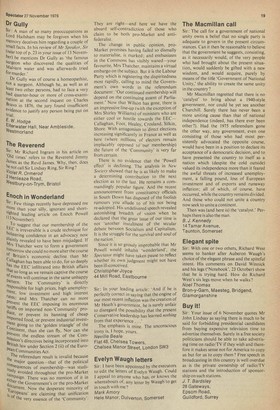The Macmillan call
Sir: The call for a government of national unity owns a belief that no single party is adequate to govern in the present circumstances. Can it then be reasonable to believe that the government he suggests, consisting, as it necessarily would, of the very people who had brought about the present situation, would suddenly be gifted with a new wisdom, and would acquire, purely by means of the title 'Government of National Unity,' the ability to create the same unity in the country?
Mr Macmillan regretted that there is no 'catalyst' to bring about a 1940-style government, nor could he yet see another Churchill. Surely there has never been a more uniting cause than that of national independence (indeed, has there ever been other?). Had the 1975 referendum gone the other way, any government, even one consisting of those who had most persistently advocated the opposite course, would have been in a position to declare its acceptance of a democratic decision, and to have presented the country to itself as a nation which (despite the cold outside) valued its independence more than it feared the awful threats of increased unemployment, a falling pound, loss of European investment and of exports and runaway inflation; all of which, of course, have occurred, while the country remains divided. And those who could not unite a country now seek to unite a continent.
Then was (and here is) the 'catalyst.' Perhaps there is also the man.
B. J. Kennedy 14 Tamar Avenue, Taunton, Somerset










































 Previous page
Previous page